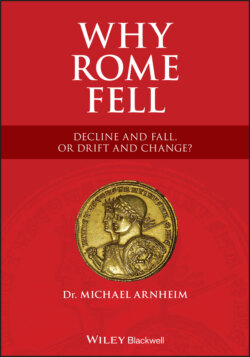Читать книгу Why Rome Fell - Michael Arnheim - Страница 70
Conclusion
ОглавлениеDiocletian’s accession in 284 marked both the culmination of several longstanding trends and also the introduction of some major new policies. His thoroughgoing reform of provincial administration secured the borders and tightened up the imperial bureaucracy. His concern with the army is also reflected in two very different policies. His persecution of Christianity was evidently a reaction to Christian reluctance to serve in the military. And his Edict of Maximum Prices of 301 was issued in response to soldiers’ complaints about inflationary prices, though pegging the price of a live male lion or a pound of purple silk at 150,000 denarii probably did little to assist the average soldier.
Augustus had managed to hold the loyalty of the senatorial aristocracy by reserving provincial governorships to the membership of this order. This privilege was diluted by later emperors, who increasingly used senatorial status purely as a ploy, introducing outsiders into the Senate only to appoint them to governorships. Then, in the third century, emperors cut the Gordian knot (no pun intended) by bypassing the Senate and appointing non-senators to governorships directly. This trend was completed by Diocletian, who finally eliminated men of senatorial origin from practically all positions of importance.
